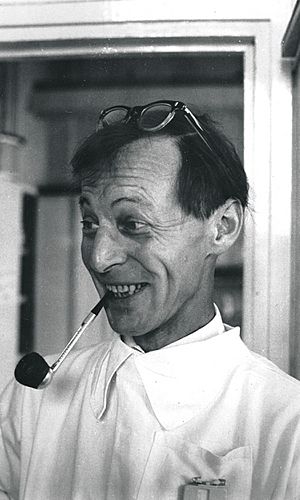John H. Humphrey facts for kids
Quick facts for kids
John Herbert Humphrey
|
|
|---|---|
 |
|
| Born | 16 December 1915 |
| Died | 25 December 1987 (aged 72) |
| Nationality | British |
| Alma mater | Trinity College, Cambridge |
| Scientific career | |
| Fields | Bacteriology, Immunology |
| Institutions | National Institute for Medical Research, University College Hospital |
John Herbert Humphrey was a British scientist. He studied bacteria and the body's immune system. He was born on December 16, 1915, and passed away on December 25, 1987. He received special honors for his important work.
Contents
His Early Life and School
John Humphrey went to Winchester School when he was younger. Later, he studied at Trinity College, Cambridge. He finished medical school in 1940. This was at the University College Hospital medical school.
His Work as a Scientist
After medical school, John Humphrey worked at Hammersmith Hospital. He also did research at the Lister Institute. From 1943 to 1946, he was an assistant pathologist at Central Middlesex Hospital.
In 1946, he joined the Medical Research Council. He worked as a bacteriologist at University College Hospital.
Working at the National Institute
In 1949, Humphrey joined the National Institute for Medical Research (NIMR). He worked on setting standards for medicines. With another scientist, James Lightbown, he helped create international standards for antibiotics and enzymes. He also worked closely with the World Health Organization (WHO) on these standards.
In 1957, he became the head of a new department at NIMR. This department focused on Immunology, which is the study of the body's immune system.
From 1961 to 1976, Humphrey was the Deputy Director of NIMR. He even became the acting director in 1969. In 1975, he left NIMR to become a professor. He taught immunology at the Royal Postgraduate Medical School. He retired from his work in 1981.
Starting a Society for Immunology
In November 1956, John Humphrey helped start the British Society for Immunology. He created it with other scientists like Robin Coombs and Avrion Mitchison. This society helps scientists who study the immune system. He also became the president of the International Union of Immunological Societies.
Awards and Special Recognitions
John Humphrey received many honors for his scientific work.
- In 1963, he was chosen as a Fellow of the Royal Society. This is a very high honor for scientists in the UK.
- In 1981, he gave a special talk called the Croonian Lecture. He spoke to the Royal College of Physicians about how understanding the immune system helps in medicine.
His Family Life
John Humphrey's parents were Mary Elizabeth and H. A. Humphrey. His father was an engineer who invented a special pump. His aunt, Edith Humphrey, was also a scientist. She was the first British woman to earn a PhD in chemistry.
At Cambridge University, John met his wife, Janet. Her father was Archibald Hill, a famous physiologist who won a Nobel Prize. Her mother was Margaret Hill, who worked to improve society. John and Janet had five children. They also raised John's nephew and niece after his brother passed away.
 | Madam C. J. Walker |
 | Janet Emerson Bashen |
 | Annie Turnbo Malone |
 | Maggie L. Walker |

